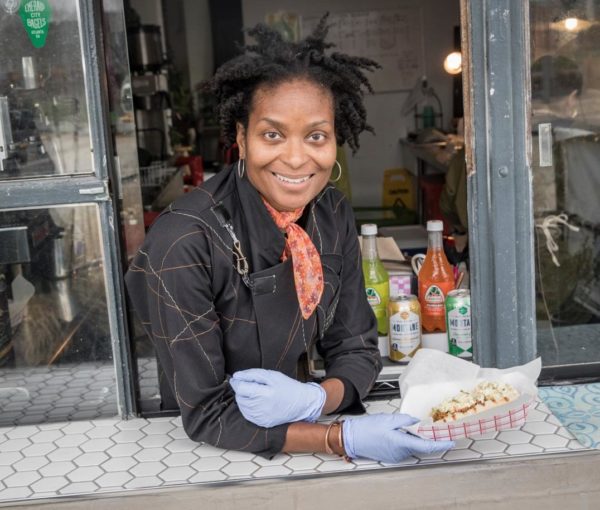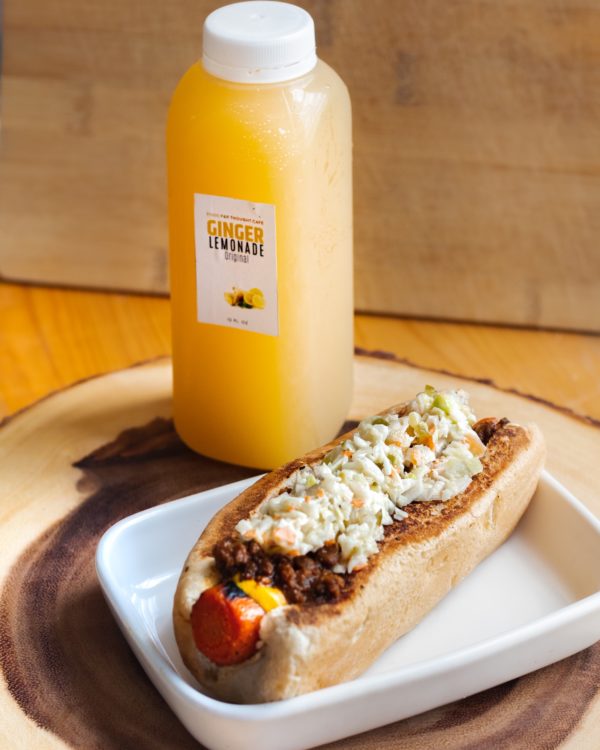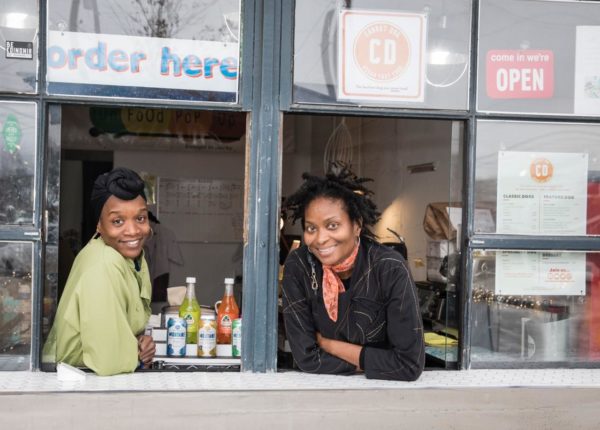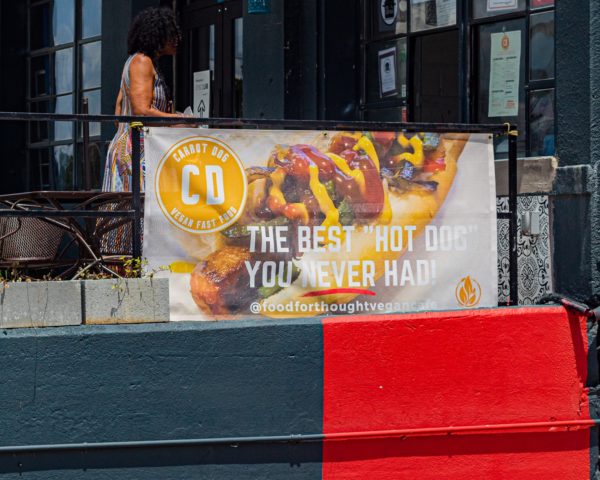West End is a predominantly Black historic community in Atlanta that has been a destination for vegan and vegetarian eateries for decades. We highlight some key players in the neighborhood who are changing the community one healthy meal at a time.

Name: Kemi Bennings
Age: 29 and holding
Hometown: Augusta, Georgia
Profession: Chef
Years of Experience: 18 years
What: Food For Thought Vegan Cafe, home of the Carrot Dog and The Soup Bar
Where: Saturdays at 680 Murphy Ave. Atlanta, GA 30310
Tell me about your business and how did you get started.
In 2004, before pop-ups were popular, I had a pop-up [restaurant] in my home in Grant Park. I’ve been very influential in the art, music and culture scene here in Atlanta for a long time, and it was for artists and art enthusiasts. I crafted a menu and it took off to the point that I found myself with some clients. This is when the [Atlanta] movie industry was jumping off and [someone] called me while I was out of town at my mother’s retirement and asked, ‘hey Kemi I know you do this during the week, but can you service someone when you get back in town?’ I said ‘well, sure.’
Long story short, my first personal chef clients were Kimberly Elise, Tyler Perry, Cicely Tyson, so the culinary passion just took some wings of its own through my life’s journey. I’ve always been fascinated with cooking and cooking shows since I was a little girl, so the first Food for Thought Cafe at that time was the actual lunch spot itself. It’s kinda transformed into a restaurant group. Food for Thought Cafe is more of an umbrella for the likes of Carrot Dog and The Soup Bar. Those are my flagship concepts.
What does your menu have to offer?
Carrot dog is a spin on the American classic hot dog and I make a brine of about 15 or 16 different spices. I soak the dogs and it literally tastes like a hot dog and it’s a carrot. We’ve had clients who don’t like carrots, but it’s amazing the response to the concept of Carrot Dog. It’s also parallel to some of my other work. I’m also a nurse and certified lifestyle coach, and so it also opens up the conversation of health and wellness particularly around people of color. We service everyone, but I have an added interest in the health and wellness in the culture of [Black] people. I got the concept of Carrot Dog when I was traveling in 2015. I was in San Juan, Puerto Rico, and I visited a little vegan pizza joint and the chef and I got to talking and she actually introduced this concept to me because she was working on it.

I make a homemade ginger lemonade, I make a homemade ginger lemonade with turmeric, I make a delicious lemon bar, and most recently the dessert is a carrot tart and it’s kind of a lighter version of a sweet potato pie. I wanted to build out a concise, simple menu really highlighting the dogs. Our two top best sellers are The ATL, which has mustard, vegan chili, and slaw and the L.A. Dog is a vegan bacon wrapped Carrot Dog.
[As for The Soup Bar], a friend challenged me to make this gumbo, and so one day I was like, ‘let me just try it’ and so I made this pot of gumbo and of course it was a lot larger than a sample and so I just put it out on Facebook to some friends, wanting some feedback on this gumbo. I put it out and literally it was gone and everyone was like, ‘I want a bowl! I want a bowl!’ That literally started the impetus for the soups. It was around October, November, so it was perfect timing to introduce that because you know it was during the winter months, but I eat soup year round. I’m a soup girl.
Why did you choose to open your business in the West End? [Editor’s note: Food for Thought is actually located in the Adair Park neighborhood adjacent to West End.]
There are a lot of underserved areas, particularly those underserved areas are populated by Black and brown people. When it comes to health and wellness, as a nurse I’m just interested in the overall wellness of people in general, but I do have a avid interest in African-Americans because, number one, I’m a Black woman and, number two, as a nurse you see the trends of hypertension, diabetes, heart disease kinda run rapid in our communities. Carrot Dog or anything I do is kind of an offshoot to allow people to experience what’s possible with plant-based cuisine.

There have been complaints over the years about Black communities not having access to healthy food, but West End seems to be a hotspot for vegan and vegetarian eateries. Why do you think that is?
I think that there’s a gap; access to capital, leveling of the playing field as it relates to opportunities that are afforded. I think that does play a role especially in a world of gentrification as well, which is very real and I think it’s quite a few factors and there are people on the ground, in the community working to rectify that. I think COVID-19 in a certain way is addressing that with various companies coming out saying, ‘Hey, we want to give dollars and want to bring grants, loans,’ and various things like that so there are people on the ground.
With an uptick of businesses and people moving into the area and the Atlanta Beltline expansion, West End seems to be experiencing a resurgence. However, gentrification has also been a concern for many. How are Black business owners responding to gentrification?
That’s a loaded question. When you have limited access and there’s already a gap there from a standpoint of property, and in order to get property you have to get a loan most times or an investor of sorts — when the playing field is already unleveled and sometimes you don’t get access to even down to the notifications, sometimes you don’t get access until the property is already sold. It’s an interesting pang I have when it comes to gentrification. It really gets under my skin sometimes. Just being able to be included in the possibilities of ownership, and sometimes by the time those properties are sold by folks who have the capital, then they want to sell it back to us three times the amount. So I think we have a long way to go.

What do you want your role to be in the community?
Someone who gives a damn. Someone who’s passionate about whatever it is I’m doing and that I give a damn about the community. To be an advocate, a proponent and an example of social change.
How would you like to see the West End community five years from now?
I would like to see the community in support of each other more. More cooperative economics, more trust, overall abundant mentality. An overall sense of health, wellness and healthy lifestyle, because none of it is possible if we’re not living.
For more information about Kemi or Food For Thought Vegan Cafe, check out their Instagram and Facebook @kemibennings and @foodforthoughtvegancafe on Facebook, Instagram and YouTube.


